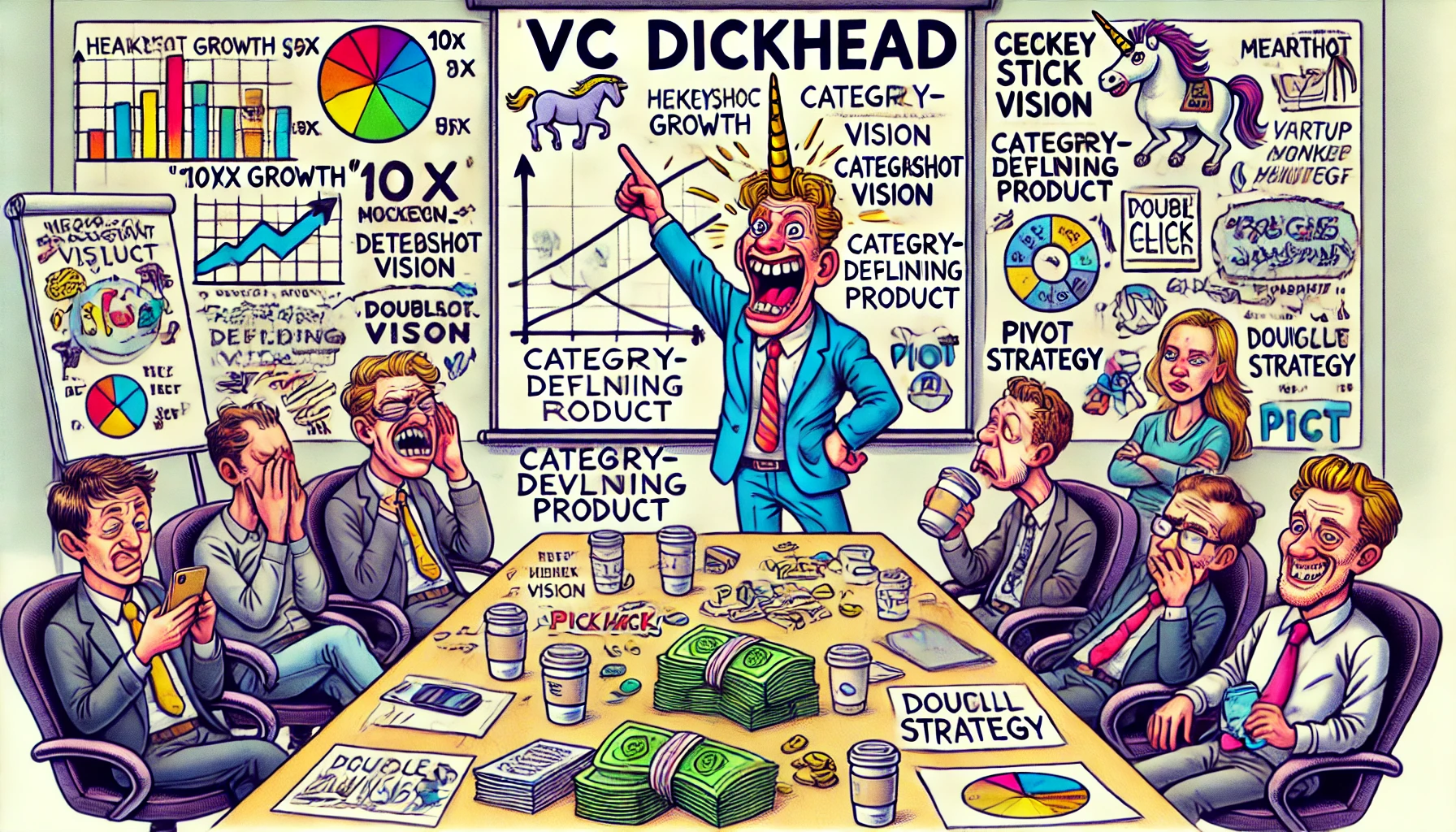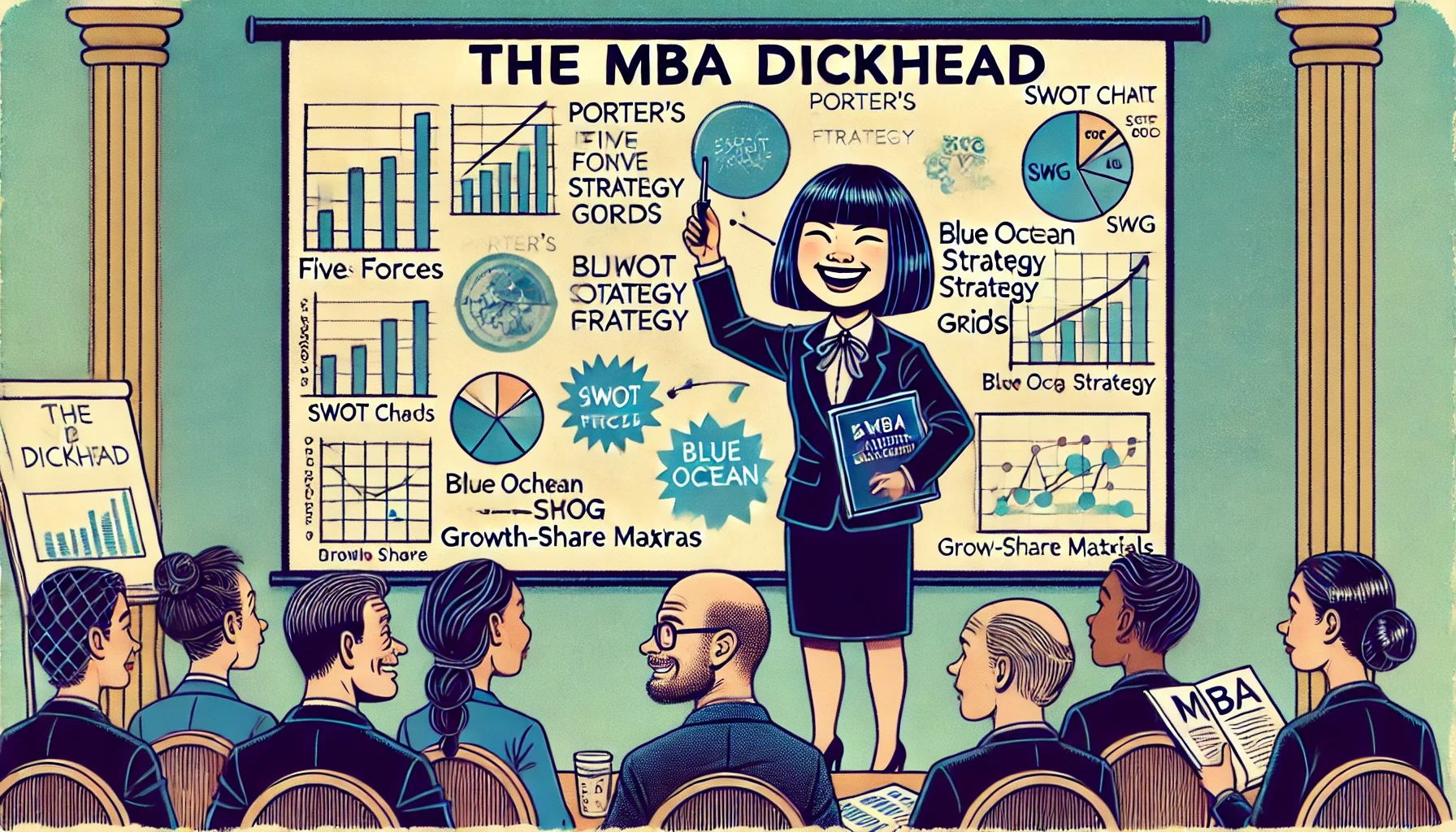Definition
Meet the VC Dickhead – the self-important venture capitalist who fancies himself a kingmaker of the tech world. This character is convinced he can spot the next unicorn at 100 paces and turn any fledgling idea into a billion-dollar success with his mere presence. In conversation, he’ll drop grandiose terms about chasing moonshot ideas and building category-defining products as if he personally crafts them. In reality, the VC Dickhead mostly just rides the waves of hype – investing in whatever buzzword-filled trend is hot this season and then claiming credit as though he foresaw it all along. He genuinely believes that tossing around enough trendy jargon will magically “10X” a company’s value, as if throwing buzzwords at a startup can instantly create a unicorn. It’s kingmaking by way of catchphrase: crown ’em with clichés and hope for a kingdom of cash.
Parody Scenario
To see the VC Dickhead in action, let’s follow a day in the life of one such specimen, showcasing how they operate with bluster and bluff:
9:30 AM – Scanning for the Next Buzzword: Our VC Dickhead starts his day sipping a $7 artisanal latte, scrolling TechCrunch and Twitter for the latest fad. This morning, he spots that “AI-powered toaster ovens” are trending. Eureka!He decides every company in his portfolio should mention AI now. If metaverse, blockchain, or quantum synergy were today’s hype, he’d be pushing those instead. His philosophy: never miss a bandwagon – if it’s buzzy, it’s part of the “vision.” FOMO is fuel, and he’s already mentally reframing each startup he’s funded as an AI-driven, paradigm-shifting moonshot by 9:35 AM.
11:00 AM – The Meeting of Many Metrics: Now it’s time for a check-in call with a founder. The VC breezes into the meeting (10 minutes late from “another very important call”) and says, “We love what you’ve done with the MVP, great job. Now let’s double-click on your growth strategy.” He proceeds to deliver a monologue of vague advice masquerading as genius: “We really need to 10X your user base by next quarter and achieve hockey-stick growth. Have you considered a pivot to a subscription model with blockchain to supercharge engagement? We’re thinking this could be a category-defining product if we integrate some AI. Just brainstorming here.” The founder is left speechless, trying to decipher which part of that word salad is actually actionable. The VC Dickhead, however, leans back proudly as if he just provided world-class strategic insight — after all, he did use all the right buzzwords in one breath.
1:00 PM – Power Lunch (Buzzwords on the Side): Over an expensive lunch, our VC hero meets a fellow investor friend for what they unironically call a “power lunch.” They speak almost entirely in jargon to impress each other. “Our latest seed deal is a moonshot in the fintech space — truly category-defining if it hits,” he boasts, while his friend nods sagely. They toss around phrases like “network effects,” “scalable go-to-market,” and “platform play” between bites of steak, each trying to one-up the other’s latest pre-money valuation brag. By dessert, our VC Dickhead has managed to namedrop two unicorn founders he’s chatted with this week and humble-bragged about how “involved” he is in guiding his startups (omitting that his guidance mostly consists of emails with more buzzwords). It’s a mutual admiration society of hype, with each participant convinced they are the visionary superstars of the tech world.
3:00 PM – Product Genius Mode (AKA meddling): In the afternoon, the VC Dickhead swings by one of his portfolio companies’ offices for a quick “product deep-dive.” Five minutes in, it’s clear he hasn’t fully grasped what the product even does, confusing it with another startup’s concept. No matter — lack of understanding never stops him from pontificating. He sketches a random Venn diagram on the whiteboard and declares they must “focus on our north-star metric.” The team endures a stream of off-the-cuff ideas: “What if we pivot to target enterprise clients and consumers simultaneously? Total addressable market, guys! Also, consider a freemium model to drive user adoption… trust me, I’ve seen it work.” The engineers exchange glances, realizing this is all noise. But the VC Dickhead is beaming, convinced he just unlocked the product’s future. He wraps up by saying, “I’m super excited about where you’re heading — this has unicorn potential,” and leaves as abruptly as he arrived, off to his next meeting, blissfully unaware of the confusion left in his wake.
6:00 PM – Twitter Victory Lap: Day done, our VC Dickhead retires to his condo and fires up Twitter (because of course he has a following to feed). He posts a 20-tweet thread recounting his “insights” of the day. It starts with: “Lesson 1: Always think in terms of 10X. Founders, don’t be afraid to pivot and disrupt!” 🚀 and goes on to praise one startup’s “incredible progress” (adding, “We’re seeing real hockey-stick growth” – a slight embellishment) and another’s “killer team executing a bold vision.” He might even toss in a photo of himself on a panel or a humblebrag about that lunch: “Great chat today with some fellow investors about building the next category-defining product.” Each tweet is dripping with self-congratulation and trendy lingo. Satisfied, he watches the retweets roll in from other VC buddies. In his mind, he’s not just an investor but a thought leader extraordinaire. And thus, another successful day ends for the VC Dickhead — having accomplished little beyond words, yet utterly convinced of his own genius.
Why They Exist
It’s perplexing that the VC Dickhead thrives, but the ecosystem practically lays out a red carpet for this behavior. FOMO-driven investing is a big reason: in venture capital, everyone fears missing the next big thing. If one loud VC Dickhead starts hyping a startup as the next big moonshot, others often pile in purely out of fear of missing out on a potential unicorn. Hype attracts more hype, and suddenly our buzzword kingmaker looks like a trendsetter (when he really just followed the herd).
The tech media glorifies these characters as if they truly are visionary geniuses. A VC who lucks out on one big win will grace magazine covers with headlines like “Meet the Wizard Who Backed a Unicorn.” Never mind the dozen duds in his portfolio — those don’t make for exciting headlines. This media celebrity treatment further inflates the ego (and perceived importance) of the VC Dickhead, giving him a platform to spout more jargon on stages and podcasts à la a TED Talk.
Moreover, venture capital runs on the logic of power-law returns – meaning one massive success can outweigh countless failures. This encourages a “spray and pray” approach where a VC Dickhead makes many wild bets and loud promises. If even one startup hits that hockey-stick growth curve, he’ll claim victory and conveniently forget the flops. Being mostly wrong has little consequence as long as he’s a little right once. Thanks to this dynamic, style often triumphs over substance: talking big and projecting confidence can attract big money. In an industry obsessed with “disruption” and rapid scaling, a person who sounds like they have bold ideas can thrive without necessarily delivering results. As long as money is flowing and valuations keep rising, the VC Dickhead’s buzzword-laden antics continue to find an audience — and victims — in the startup world.
How to Spot One
Not sure if you’re dealing with a bonafide VC Dickhead? Here are the telltale signs and behaviors that give them away:
Buzzword Bingo Champion: They can’t finish a single conversation without dropping a pile of trendy terms. If you hear phrases like “let’s double-click on that,” “hockey-stick growth,” “10X opportunity,” and “moonshot vision” all in the span of five minutes, you’ve got a heavy case of buzzword overload on your hands. They use so much MBA-speak that meetings feel like a jargon contest. (Pro tip: if you silently play Buzzword Bingo, you’ll win by the second slide of their pitch deck.)
Unrealistic Growth Demands: The VC Dickhead expects every startup to grow astronomically fast. It’s not enough to double revenue or users – it has to be “Why can’t you 10X this by next quarter?” They talk constantly about hyperscaling and “going viral” as if it’s a simple switch to flip. If your metrics aren’t shooting up at a 45° angle on every chart, they’ll frown and ask why you’re not delivering “hockey-stick growth” already. Their expectations are beyond ambitious – they’re absurd, and often impossibly detached from reality.
Valuation Fixation Over Business Basics: You’ll notice they obsess over your valuation and status more than your actual business fundamentals. They care deeply about buzzworthy labels – “unicorn status”, “pre-money valuation”, the next funding round – but go oddly quiet when you bring up paths to profitability or steady cash flow. In meetings, they’re more likely to grill you on what valuation you’ll pitch for the next round than on how you’ll monetize your product. If someone is practically salivating over your potential $1 billion valuation while brushing off your actual revenue model, that’s a big red flag.
Social Media Self-Promoter: Check their Twitter or LinkedIn – it’s practically a shrine to themselves. The VC Dickhead loves broadcasting their “wisdom” in long threads or inspirational posts. They’ll live-tweet advice like a life coach for startups, often with rocket ship emojis and hashtags like #growth #disruption. They post humblebrag updates: “Thrilled to see my portfolio company X achieve what we envisioned – true category-defining product in the making!” or “Honored to be on stage discussing how to 10X your vision.” If you see a constant stream of self-congratulatory thought-leadership pieces and reposts of their own quotes, you’ve spotted one. They’re their own biggest fan.
Pseudo-Advisor, Actual Imposter: In meetings they pretend to be deeply involved and knowledgeable, but scratch the surface and it’s clear they barely understand the business. They’ll say “we” a lot – “we need to execute better on our go-to-market” – as if they’re part of the team, yet they might forget your product’s name or what your company actually does. They nod sagely at every discussion point, then chime in with something like “Have you considered expanding internationally to supercharge growth?” even if your startup is nowhere near ready. This person loves to play the guru, but their advice is often either generic common sense or wildly off-base. If your investor talks a big game about being “hands-on” but only shows up to push random pivots or to complicate your cap table with obscure terms, you’ve got a VC Dickhead on your hands.
The VC Vest and Conference Circuit: For good measure, you might spot the uniform. Many VC Dickheads can be seen sporting the obligatory branded Patagonia vest over a button-down, flexing at exclusive conferences where they swarm the stage. They’ll happily moderate a panel on “Unlocking Unicorn Growth” and refer to themselves as a “mentor” or “coach” to founders. If someone fits the look and is constantly name-dropping which summit or demo day they spoke at – all while dishing buzzwords – consider your suspicion confirmed.
How to Deal With Them
Dealing with a VC Dickhead as a founder or employee is a special skill. Here’s a satirical survival guide to keep you sane (and your startup alive) when navigating their nonsense:
Learn Their Language (But Don’t Drink the Kool-Aid): To survive conversations, you’ll need to become a temporary Buzzword-to-English translator. When they say, “We need to see a moonshot here,” interpret it as “they want big ideas – I’ll humor them with an ambitious concept, then proceed with what actually makes sense.” Nod along as they spout “supercharge this, 10X that,” and respond in kind: “Absolutely, we’re iterating on an MVP that can scale to a category-defining solution.” You’re effectively speaking their dialect so they feel heard, while internally you translate it back to reality. It keeps them happy, and you can get back to real work once the meeting ends.
Smile, Nod, and Redirect: Often the best tactic in meetings is to let them have their jargon-filled say, then gently steer the discussion to productive ground. For example, if they demand “hockey-stick growth ASAP,” you might reply, “Great, we’re aligned on aggressive growth. Let’s double-click on the timeline and resources needed to get there in a sustainable way.” Use one of their favorite terms (“double-click” never fails) to segue back to practicalities. By couching your realistic plans in their buzzwords, you satisfy their ego and keep your strategy on track. It’s like feeding a toddler their vegetables hidden in mashed potatoes.
Pick Your Battles (and Pivots): When a VC Dickhead pushes an absurd pivot or pet idea, evaluate if it has any merit. If it’s harmless or possibly useful, consider a small experiment to appease them: “Sure, we’ll run a quick pilot on that new feature and see the data.” This can buy you goodwill and time. However, if their grand idea is truly off the rails, be prepared with data and reasoning to (politely) push back. Frame it as “staying focused on our core metrics right now to avoid distraction – we can revisit that idea in the next phase.” Basically, don’t let them derail your company on a whim. Give them just enough to feel involved, but shield your startup from becoming a Franken-product of every random suggestion.
Manage the Expectations Game: Set realistic goals and communicate them in terms they understand. Instead of flat-out saying their 10X in one quarter goal is crazy, try: “We’re aiming for 2X growth this quarter as a foundation, which will position us to accelerate after that – a stepping stone to that 10X trajectory you envision.” This way you’re acknowledging their big dream but inserting a dose of reality. Get agreement on interim milestones. When they see progress (even if it’s not a literal 10X instantly), spin it as “on the path to exponential growth.” Managing a VC Dickhead is often about marketing your results to them in a palatable way.
Keep Receipts (aka Data) for Reality Checks: Document decisions and keep data on hand to counter their more outlandish claims. When they insist on something like “Users will love this new gamification feature, trust me,”have your user survey data or A/B test results ready to show, “Actually, only 5% tried it – perhaps we should refine it before full rollout.” It’s harder for them to argue with concrete numbers (they’ll try, but still). This also helps if they have selective memory later about who suggested what. You might gently remind them, “As we saw in the data from last month…,” to anchor the conversation back in facts whenever it floats off into buzzword fantasyland.
Leverage Their Strengths (and Ignore the Rest): Even a broken clock is right twice a day. Sometimes VC Dickheads do have useful connections or can generate buzz that benefits your company. Use that! Let them intro you to that big potential client or brag about you on CNBC – those are things they’re actually good at. Just take their strategic advice with a grain of salt. Engage them in areas where their bluster can help (like PR or opening doors), and tactfully sidestep them in areas where it hurts (product decisions, day-to-day operations). Remember, part of dealing with them is managing up – guide them to contribute in ways that align with your goals, even if they think it was their idea all along.
Know When to Run (or Cut Ties): Finally, recognize if it’s just too much. Not all money is good money, and not all advice should be followed. If your VC’s demands and meddling are steering you off a cliff, it might be time to part ways (or if you’re an employee, update that résumé). This could mean seeking out a different investor who actually adds value, or if you’re stuck, learning to firmly say “no” to bad ideas despite the power dynamic. In extreme cases, the best survival tip is to escape – better no deal than a deal with a value-destroying egomaniac. It’s your startup (or career) on the line, after all. As the saying goes, when someone shows you who they are, believe them – and be ready to sprint in the opposite direction if needed.
Dealing with a VC Dickhead can be exhausting, but with a bit of tactical finesse (and a sense of humor), you can survive the ordeal. Keep your bullshit radar on, trust your own business instincts, and don’t get swept away by the buzzword tornado. At the end of the day, remember that actual progress is what builds companies, not just fancy phrases. Smile when they rant about “power law outcomes” and “disrupting paradigms,” but keep your eyes on building your product and company in the real world. With any luck, you’ll navigate around their nonsense, hit real milestones, and one day gently remind them that you built a great business – while they were busy saying “we.” After all, the best revenge on a VC Dickhead is success on your own terms, minus the jargon.



